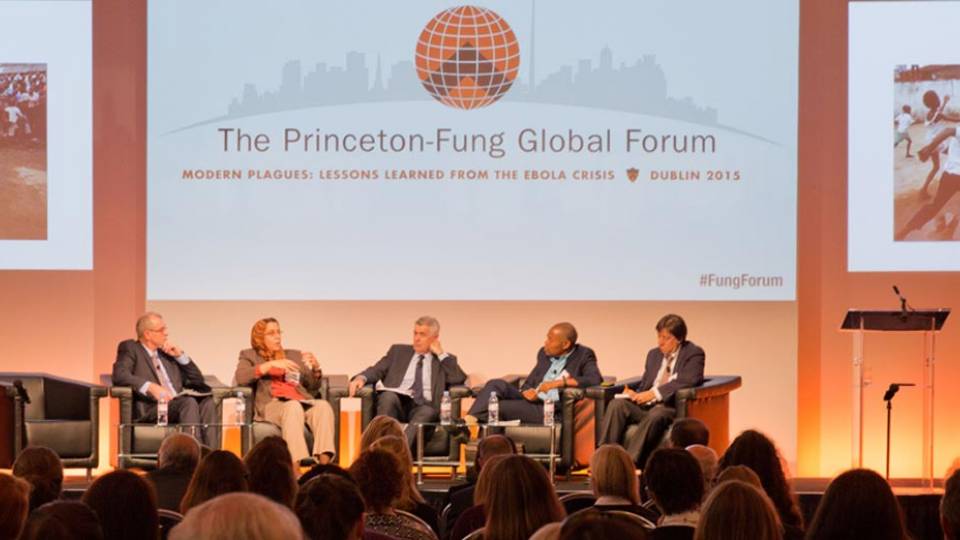The fourth Princeton-Fung Global Forum will convene researchers, scientists, policymakers, officials from nongovernmental organizations and industry leaders to examine digital technologies in the information age.
The event, “Society 3.0+: Can Liberty Survive the Digital Age?(Link is external),” will be held March 20-21, 2017, in Berlin and will explore how different countries and sectors approach the balance between risks, benefits and fundamental rights when it comes to cybersecurity and digital communications.
Topics will include privacy and human rights versus security protection; vulnerabilities versus efficiencies posed by the Internet of Things; communication silos versus unfiltered information; information access versus blockage; and a vision for a global cooperation plan.
“Digital technology today shapes the lives we lead and the threats that confront us,” said Princeton President Christopher L. Eisgruber. “This landmark conference will bring together leading experts from multiple sectors and countries to discuss issues critical to 21st-century society.”
The forum, which will be held at the Berlin Congress Center, is being organized by Princeton’s Woodrow Wilson School of Public and International Affairs(Link is external) in coordination with partners across campus including the Center for Information Technology Policy(Link is external), the Office of Development(Link is external) and the Office of Communications(Link is external). Registration, which is required, is now open to the public(Link is external).
The Princeton-Fung Global Forum was established in 2012 as part of a $10 million gift from William Fung, a 1970 Princeton graduate and former University trustee who is group chairman of the Hong Kong-based company Li & Fung.
The first forum, “The Future of the City,” was held in 2013 in Shanghai; the second, “The Future of Higher Education” was held in 2014 in Paris. The third forum, held in 2015 in Dublin, focused on “Modern Plagues: Lessons Learned from the Ebola Crisis.”
This year’s conference will include keynote addresses by:
- Vinton Cerf, vice president and chief internet evangelist, Google; a “father” of the internet
- Roger Dingledine, co-developer, project leader, research director, The Tor Project
- Neelie Kroes, former vice president and commissioner for digital economy and society, European Commission; member of the board, Salesforce
- Brad Smith, president and chief legal officer, Microsoft; Princeton Class of 1981
The conference will begin with an introduction titled “How Did We Get Here? Past, Present and Future of the Internet.” Panel topics will include “The ‘World’ Wide Web,” “New Platforms for Control,” “The Internet of Things,” “Communication Silos and Information Overload,” “Access (Denied) to Information” and “Regulating Web 3.0+.” The conference will conclude with a keynote address titled “Who Owns the Internet? Who Has Final Say Over the World Wide Web and Digital Technology?”
Along with Eisgruber, Princeton University speakers on the program include:
- Andrew Appel(Link is external), Eugene Higgins Professor of Computer Science(Link is external)
- David Dobkin(Link is external), Phillip Y. Goldman ’86 Professor in Computer Science
- Nick Feamster(Link is external), professor of computer science; acting director of the Center for Information Technology Policy
- Ed Felten(Link is external), Robert E. Kahn Professor of Computer Science and Public Affairs; director of the Center for Information Technology Policy; U.S. Deputy Chief Technology Officer, Office of the White House
- Prateek Mittal(Link is external), assistant professor of electrical engineering(Link is external)
- Arvind Narayanan(Link is external), assistant professor of computer science
- Joel Reidenberg, visiting research collaborator at the Center for Information Technology Policy
- Jennifer(Link is external) Rexford(Link is external), Gordon Y.S. Wu Professor of Engineering(Link is external); professor of computer science; chair of the Department of Computer Science
- Cecilia Rouse(Link is external), dean, Woodrow Wilson School; the Lawrence and Shirley Katzman and Lewis and Anna Ernst Professor in the Economics of Education; professor of economics(Link is external) and public affairs
- Matt Salganik(Link is external), professor of sociology(Link is external)
- Janet Vertesi(Link is external), assistant professor of sociology
Other participants will come from Amazon.com Inc.; ANACOM; Bits and Atoms; Center for Democracy & Technology; Electronic Frontier Foundation; Hogan Lovells; Humboldt University of Berlin; Rio Institute for Technology and Society; Stanford University; University of Colorado; University of Haifa; University of Zurich; Upturn; Worcester Polytechnic Institute; and the WZB Berlin Social Science Center. Panel moderators hail from Frankfurter Allgemeine Zeitung, Slate Magazine, The New York Times and Vox.com.
More information on the 2017 forum, as well as links to information on the earlier events, is available on the Princeton-Fung Global Forum website(Link is external).



